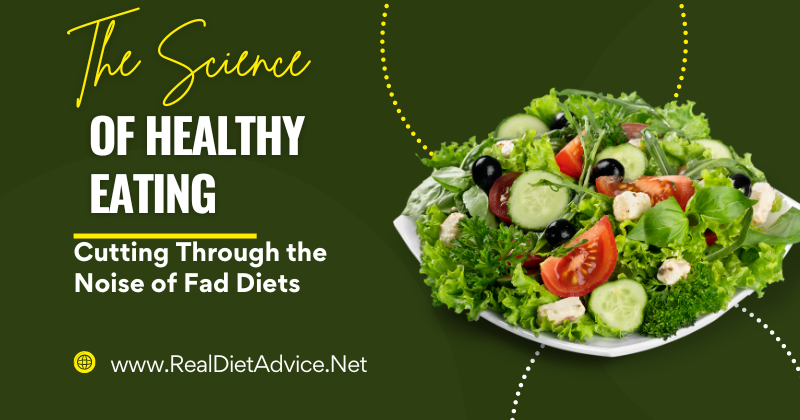Introduction
In our fast-paced modern world, countless individuals are on a quest to find the perfect diet that will help them attain their health and fitness objectives. With the abundance of fad diets and nutritional misinformation, it can be difficult to differentiate between what is genuinely advantageous and what is merely a fleeting fad. Consequently, it is crucial to rely on evidence-based methods and gain a solid understanding of the science behind healthy eating. This article serves as a comprehensive guide to help you establish a well-balanced, sustainable, and healthy lifestyle, empowering you to make well-informed decisions that yield enduring results.
In the current world, the abundance of fad diets and misinformation about nutrition often misleads people to embrace unhealthy and unsustainable eating habits.
Grasping the science underpinning healthy eating is vital for making educated decisions and sustaining long-term well-being.

1. Defining Healthy Eating and its Advantages
- A well-rounded diet encompasses a suitable combination of macro-nutrients (carbohydrates, proteins, and fats) and micro-nutrients (vitamins and minerals), promoting ideal health and energy levels.
- Adequate nutrition is crucial in disease prevention, weight management, and overall health, leading to an improved quality of life.
2. Exposing Fad Diet Misconceptions
- Fad diets frequently promise quick weight loss or other health perks, enticing those seeking immediate solutions.
- Such diets usually enforce strict limitations, remove entire food groups, or concentrate on a single nutrient.
- Fad diets can result in nutrient shortfalls, weight regain, and adverse long-term health consequences.
3. Comprehending the Science of Macro-nutrients
- Carbohydrates supply the body’s primary energy, supporting brain functions and physical activities.
- Proteins are crucial for the growth, repair, and maintenance of bodily tissues and immune functions.
- Fats are essential for hormone production, nutrient absorption, and sustaining healthy cell membranes.
4. The Importance of Micro-nutrients in a Nutritious Diet
- Vitamins are indispensable for diverse bodily functions, including metabolism, immune response, and cell growth.
- Minerals aid in growth, development, and overall health by facilitating bone formation, fluid balance, and nerve functions.
5. The Relevance of Hydration in a Healthy Eating Regimen
- Water is indispensable for digestion, temperature regulation, and waste elimination.
- Identifying dehydration signs and implementing strategies to preserve proper hydration is crucial for total well-being.

6. Evidence-Based Nutritional Recommendations
- Adhering to guidelines from esteemed health organizations ensures a balanced diet.
- Tailored nutrition plans cater to individual dietary requirements and preferences, fostering long-term achievement.
7. Suggestions for Making Knowledgeable Food Choices
- Deciphering food labels and marketing assertions is fundamental to choosing healthier options.
- Selecting nutrient-rich foods and steering clear of empty calories bolsters a well-balanced diet.
- Conscious eating and portion management aid in avoiding over-consumption and fostering healthier practices.
8. The Influence of Lifestyle Elements on Healthy Eating
- Sleep and stress can profoundly affect nutritional choices, underscoring the necessity for proper management.
- Consistent physical activity enhances a healthy diet by promoting weight stability and general well-being.
9. Exploring the Realm of Nutritional Supplements
- Supplements can provide advantages but also present risks; grasping the pros and cons is crucial.
- Expert advice can help evaluate the suitability of supplementation for individual situations.
Conclusion
To sum up, emphasizing the science of healthy eating and avoiding fad diets is the foundation for achieving optimal health and well-being. By grasping the essentials of nutrition, acknowledging the significance of a balanced diet, and incorporating lifestyle factors such as adequate sleep, stress management, and regular exercise, individuals can take charge of their health journey and make impactful, long-lasting improvements. As we persist in learning and evolving, we encourage our readers to keep an open mind, seek trustworthy sources of information, and consult with healthcare professionals when needed. Together, we can create a healthier and more content future for ourselves and our communities.
Another thing to consider is that, it is essential to remember that there is no one-size-fits-all approach to healthy eating. Individual dietary needs can vary widely based on factors such as age, gender, lifestyle, and underlying health conditions. Therefore, a key part of understanding the science of healthy eating is to recognize and respect these differences, while aiming for the shared principles of balance, variety, and moderation in our diets. It’s also about embracing a lifelong commitment to nourishment and wellness, rather than seeking short-term solutions. By doing so, we not only improve our own health, but also set a powerful example for future generations to follow in our footsteps towards healthier living.
FAQ’s
- What is the science of healthy eating? A: The science of healthy eating explores the relationship between diet, health, and well-being, drawing from fields such as nutrition, biochemistry, and physiology.
- How is the science of healthy eating different from fad diets? A: Fad diets often promise quick results through restrictive or unusual eating habits, while the science of healthy eating promotes balanced, sustainable habits based on evidence-based research.
- What are fad diets and why are they called ‘noise’? A: Fad diets are diet trends that gain popularity quickly and are often characterized by radical or unbalanced nutritional suggestions. They are called ‘noise’ because they can distract and confuse people, making it hard to determine what healthy eating really looks like.
- What are the common characteristics of fad diets? A: Common characteristics can include promising quick weight loss, promoting ‘miracle’ foods or supplements, and often restricting or eliminating certain food groups.
- Why can fad diets be harmful? A: Fad diets can be harmful as they often promote nutritionally unbalanced eating habits, may lead to yo-yo dieting, and can potentially result in long-term health issues.
- How can we differentiate between a fad diet and scientifically-backed healthy eating? A: Science-backed healthy eating often promotes balance, variety, and moderation, whereas fad diets tend to focus on quick fixes, often involving extreme measures like severe calorie restriction or eliminating whole food groups.
- What does a scientifically-backed healthy diet generally include? A: A healthy diet usually includes a balance of macro-nutrients (protein, carbohydrates, and fats) and a variety of fruits, vegetables, lean proteins, whole grains, and healthy fats.
- Can fad diets ever be part of a healthy eating plan? A: While some elements of fad diets may be useful, such as encouraging more vegetables or less processed food, it’s important to evaluate any diet against scientific evidence. An occasional fad diet won’t necessarily harm an otherwise healthy person, but relying on such diets long term can be detrimental.
- What are some scientifically-proven tips for healthy eating? A: Tips include eating a variety of nutrient-rich foods, maintaining proper portion sizes, drinking plenty of water, minimizing processed foods, and regular physical activity.
- Where can I find reliable information about the science of healthy eating? A: Reliable sources include registered dietitians, reputable health organizations, and peer-reviewed scientific publications. It’s always a good idea to consult with a healthcare professional before starting any new diet plan.
Recommended Post For You
- Custom Keto Diet Review – The Truth You Need To Know!
- The Quality-First Approach: Uncovering The Ultimate Diet Secret
- Building a Balanced Plate: A Practical Guide to Real Diet Advice for Everyday Eating
- Real Diet Advice: Uncovering Evidence-Based Nutrition Strategies for Optimal Health
- Debunking Diet Myths: A Comprehensive Guide to Authentic Weight Loss Tips
- Best Diet Plan For Weight Loss That Works
- Sustainable Weight Loss: Real Diet Advice for Lasting Results and Improved Well-being
References:
You might consider visiting the websites of established health and nutrition organizations. Here are a few examples:
- Harvard T.H. Chan School of Public Health’s Nutrition Source: https://www.hsph.harvard.edu/nutritionsource/
- Mayo Clinic’s Healthy Lifestyle Nutrition and Healthy Eating: https://www.mayoclinic.org/healthy-lifestyle/nutrition-and-healthy-eating/
- The American Heart Association’s Healthy Eating: https://www.heart.org/en/healthy-living/healthy-eating
- The Academy of Nutrition and Dietetics: https://www.eatright.org/
